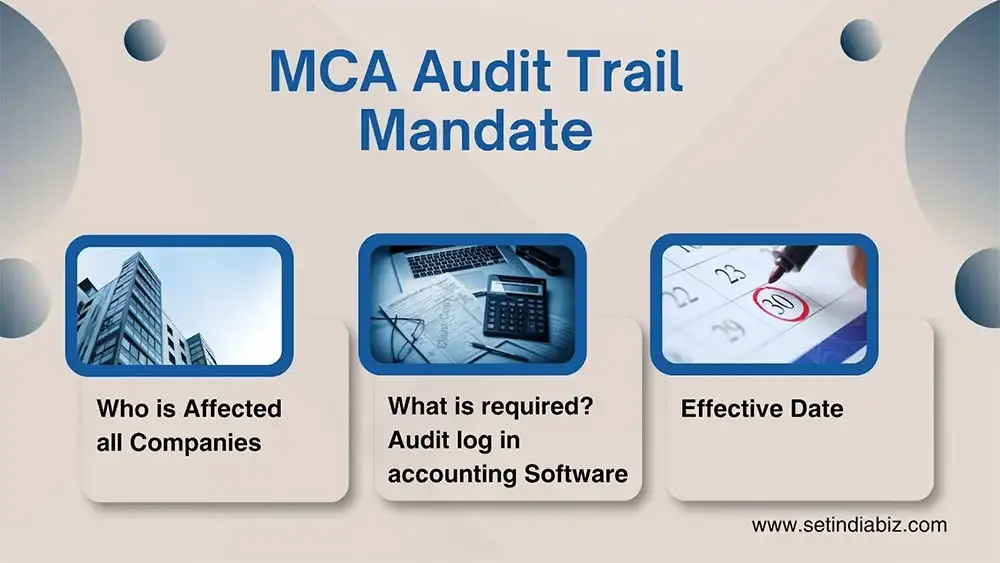MCA Audit Trail Compliance: Essential Guide for Indian Companies Using Accounting Software
Overview : The Ministry of Corporate Affairs has mandated audit trail features in accounting software for all companies under the Companies Act 2013, effective from April 1, 2023. This amendment to Rule 3(1) of the Companies (Accounts) Rules, 2014, requires companies to use only accounting software that records an unalterable audit trail of every transaction, creating edit logs with timestamps for all changes made to books of account.
Legal Framework and Background
The audit trail mandate originated from the Companies (Accounts) Amendment Rules, 2021, issued through MCA notification dated March 24, 2021. Initially scheduled for implementation on April 1, 2021, the requirement faced multiple deferrals due to practical difficulties and cost implications, finally becoming mandatory from April 1, 2023.
Section 128 of the Companies Act 2013 mandates that companies maintain proper books of account, whilst Rule 3(1) of the Companies (Accounts) Rules, 2014 now specifically requires that accounting software must have three fundamental characteristics:
| Audit Trail Recording | Edit Log of Each Change | Audit Trail Integrity |
|---|---|---|
| Accounting software must record a complete chronological history of transactions | The software must create a log of every change made, including the date | The audit trail feature cannot be disabled, ensuring system integrity |
Applicability and Scope
This requirement applies to all companies incorporated under the Companies Act, 2013 that use accounting software for maintaining their books of account. The mandate extends beyond basic accounting entries to include any software that maintains records falling under the definition of “books of account” as per Section 2(13) of the Act. For instance, if sales are recorded in standalone software and only consolidated entries are made monthly in the general ledger software, both systems must have compliant audit trail features since sales invoices constitute books of account.

Key Compliance Requirements
The audit trail feature must capture comprehensive details, including:
| No | Important Feature | Description |
|---|---|---|
| 1 | Transaction particulars | Every transaction entry in the books of account must include details such as date of transaction, the value of transaction in rupee (amount), nature and purpose of the transaction (narration), account heads affected, and supporting document references to ensure complete audit trail compliance. |
| 2 | Modification details | The system must automatically log all changes, amendments, deletions, and reversals made to any accounting entry, including before and after values, reason for modification, and approval workflows to maintain transparency. |
| 3 | User identification | Software must capture complete user details, including login credentials, employee names, designated roles, authorisation levels, and digital signatures for every action performed within the accounting system. |
| 4 | Timestamp information | The date and time stamps must be recorded for all the entries in the accounting system including transaction creation, modifications, access attempts, and system events using server-synchronized time to prevent manipulation. |
| 5 | Timestamp information | Access logs: Detailed records of user login/logout times, specific modules accessed, reports generated, data exported, failed access attempts, and session duration must be maintained for security and compliance monitoring. |
Data Preservation Requirements
Section 128(5) of the Companies Act 2013 requires books of account to be preserved for a minimum of eight financial years. Consequently, audit trails must also be retained for eight years from the date of the transaction. This aligns with preservation requirements under the Income Tax Act 1961 (six years) and GST Act (six years).
Auditor Responsibilities
Under Rule 11(g) of the Companies (Audit and Auditors) Rules, 2014, statutory auditors must verify and report whether the company used accounting software with audit trail capability, ensure that the audit trail feature operated throughout the financial year without interruption, confirm that the audit trail remained unaltered and preserved as per statutory requirements, and verify that all transactions were recorded through compliant software systems meeting MCA specifications.
Compliant Accounting Software Options

TallyPrime Edit Log Version
Specifically designed for MCA compliance, this version has an audit trail that is permanently enabled without the option to disable it. It tracks user details, timestamps, and even deleted transactions across all modules.
Zoho Books
Cloud-native solution with inherent audit trail features that maintain records of every action with timestamps and user details. The audit trail cannot be disabled, ensuring continuous compliance.
Busy Accounting Software
Offers audit trail functionality with enhanced reporting features to track changes made to records, view history of deleted transactions, and filter activities by user and date.
Marg ERP
Updated versions include MCA-compliant audit trail features with components like Bill Value Changes, User Audit Trail, and Random Stock Checking, all designed to be non-disable.Penalties for Non-Compliance
Non-compliance with audit trail requirements under the Companies Act 2013 attracts severe penalties that can significantly impact both companies and their responsible officers. The regulatory framework ensures strict enforcement through financial penalties and potential legal consequences.
| No | Penalty Type | Description | Financial Impact |
|---|---|---|---|
| 1 | Penalty on Company | Violation of Section 128 provisions relating to books of account maintenance | ₹25,000 to ₹5,00,000, depending on the nature and extent of the violation |
| 2 | Penalty on Director & KMP | Personal penalties for Managing Directors, CFOs, Whole-time Directors, and other officers in charge | ₹50,000 to ₹5,00,000 as per Section 128 |
Critical Considerations for Startups Before Software Selection
- Audit Trail Functionality Assessment: Startups must verify that audit trail features are genuinely non-disableable and meet MCA specifications. The software must automatically log every transaction, modification, and deletion with user identification and timestamps. Request live demonstrations and written confirmations from vendors regarding permanent audit trail activation.
- Data Preservation and Long-term Accessibility: The eight-year preservation requirement under Section 128(5) creates significant software selection implications. Ensure chosen software maintains data integrity and accessibility throughout this period, including provider stability, data migration capabilities, and disaster recovery protocols.
- Cloud Software Subscription Continuity Obligations: Cloud-based solutions require continuous subscription payments for 6-8 years minimum to maintain compliance. Discontinuing subscriptions could result in data loss and compliance violations. Factor ongoing costs into financial planning and negotiate long-term pricing or data portability clauses.
- Excel Backup Limitations and Inadequacy: Excel backups fail to meet audit trail requirements as they cannot maintain chronological, non-editable logs mandated by law. Excel lacks system-generated timestamps, user identification, and tampering protection, exposing startups to ₹25,000 to ₹5 lakh penalties.
- Desktop Software Advantages: The Tally Model: TallyPrime’s data portability offers regulatory advantages as data files can be accessed across machines without service provider dependency. This ensures compliance with Rule 3(1) requiring books to “remain accessible in India at all times.”
- Cloud Software and Regulatory Intent Alignment: Whilst cloud software can meet audit trail requirements, concerns exist about third-party dependency and data sovereignty conflicts. The requirement for daily backups on Indian servers under Rule 3(5) suggests legislative preference for national data boundaries.
- App-based Solutions: Suitability for Companies vs. Non-corporate Entities: Apps like Khatabook and IndiaFilings Ledger are designed for small traders, not companies under the Act. These solutions lack comprehensive audit trails, detailed access logs, adequate data preservation, and corporate accounting complexity. They’re suitable for proprietorships and partnerships, not companies.
- Data Sharing with Tax Authorities: Software must efficiently share data with Income Tax and GST departments through multiple export formats, direct government portal integration, detailed audit trail reports, searchable databases, and role-based access for officials whilst maintaining data integrity and providing certified digital signatures.
Implementation Best Practices
Companies should ensure the proper setup of charts of accounts, GST settings, and user authentication mechanisms. Regular data backups, role-based access controls, and periodic compliance reviews are essential. The annual RoC intimation under Rule 3(6) regarding cloud service usage must not be overlooked.
Conclusion
The Ministry of Corporate Affairs’ audit trail mandate represents more than just another compliance requirement – it’s reshaping how companies handle financial transparency. While the immediate pressure to upgrade accounting systems and avoid hefty penalties might feel overwhelming, companies that embrace these changes early will actually strengthen their position with investors and stakeholders who increasingly demand this level of accountability. The key is selecting compliant software and implementing proper data management from the outset, as this proactive approach to India’s evolving regulatory landscape isn’t just good practice – it’s becoming essential for long-term business success.